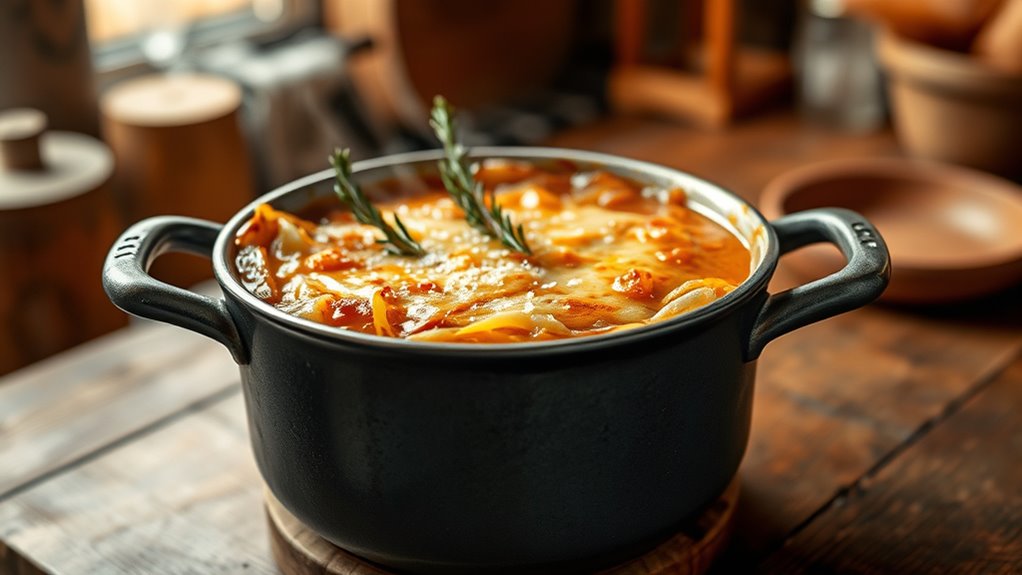To make a kosher French onion soup, start by slowly caramelizing onions in a sturdy pot with butter, until deep amber. Deglaze with a splash of dry white wine, then add kosher broth and a little salt, keeping the heat gentle so you don’t overbrown. Thicken slightly with flour, simmer until rich. Serve with dairy-friendly toppings or croutons as is. If you keep going, you’ll uncover more steps and tips to perfect it.
Ingredients and Quantity
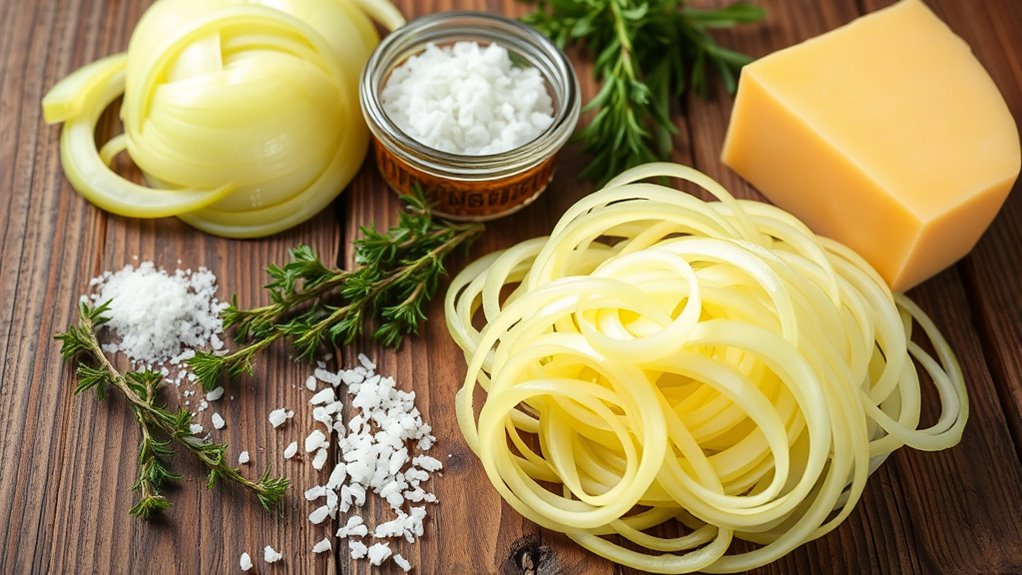
The ingredients you’ll need are straightforward: onions, butter, kosher salt, black pepper, flour, beef or vegetable stock, dry white wine, and thyme.
Table:
| Item | Quantity | Notes |
|---|---|---|
| Onions | 4 large | Thinly sliced |
| Butter | 2 tbsp | Unsalted preferred |
| Stock | 4 cups | Beef or vegetable |
| White wine | 1/2 cup | Dry, for deglazing |
| Flour | 2 tbsp | For thickening |
| Thyme | 1 tsp | Fresh or dry |
| Salt | to taste | Kosher |
| Pepper | to taste | Ground |
| Optional | onion varieties | Adds depth |
Beyond basics, consider soup alternatives like mushroom infusion or leek-forward profiles to honor freedom in flavor.
Preparations
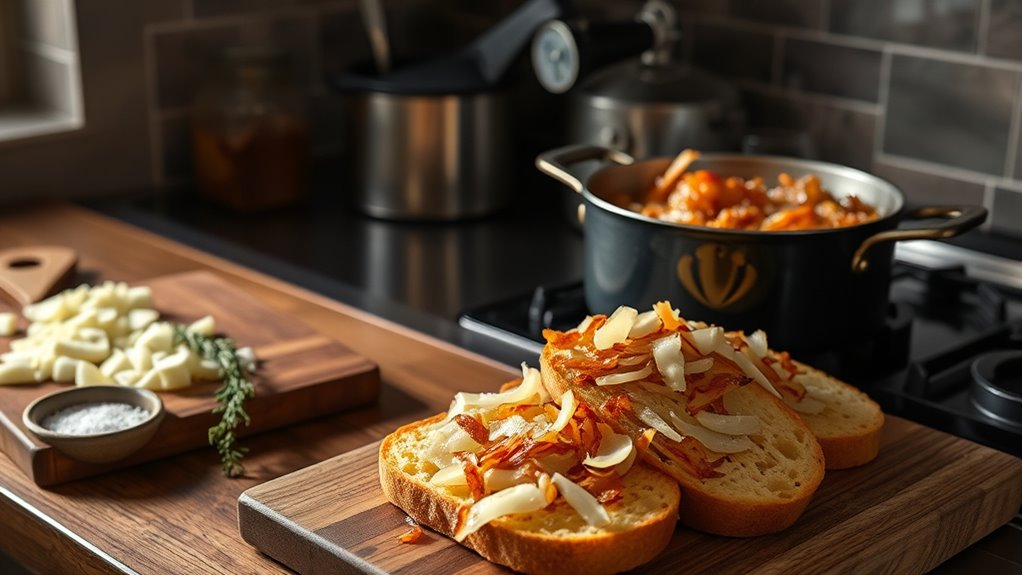
To prep, slice the onions thinly and evenly, then melt the butter in a heavy pot over medium heat. You’ll cook them slowly, stirring regularly, until they surrender their sweetness and turn deep amber—about 30 to 45 minutes. Maintain steady heat to avoid browning too quickly, which would dull the flavor. Season lightly with salt to draw out moisture, then deglaze with a splash of broth or water as needed to loosen browned bits. Plan onion selection by choosing firm, heavy specimens with tight skins for consistent slicing. Consider broth options that complement the onions: a clear vegetable broth or a light kosher beef broth will influence sweetness and depth without masking it. Finish with a precise reduction for a balanced base.
Kitchen tools or Kitchenware Required
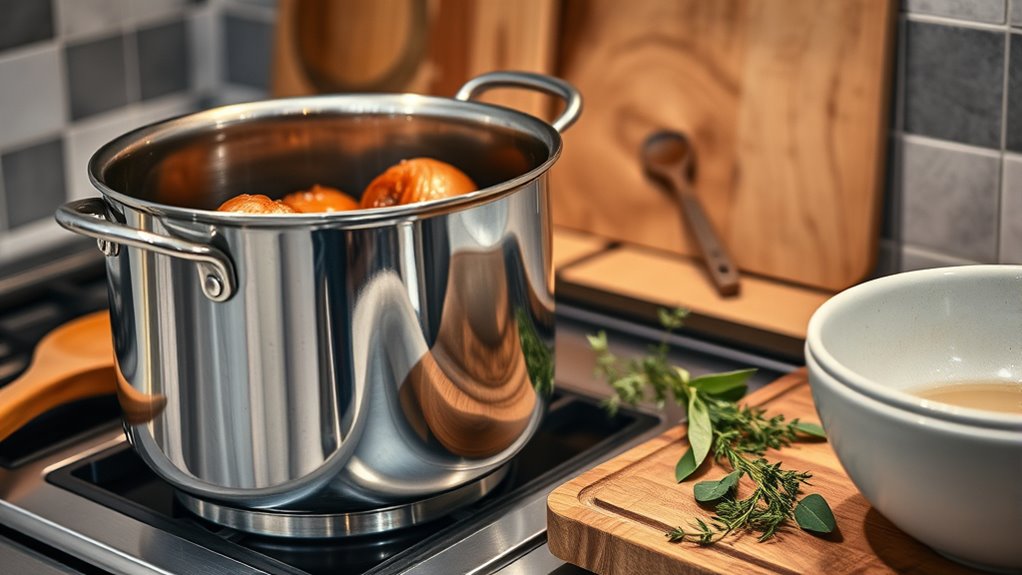
You’ll need a sturdy 4- to 5-quart heavy pot, preferably enameled or cast iron, to coax the onions without scorching. Beyond that, select a reliable soup pot for simmering and a cutting board for prep. You’ll appreciate a sharp knife, a ladle, and a thermometer for precise timing and temperature control. A sturdy spoon for deglazing helps you lift fond while building flavor. A colander and airtight containers keep ingredients organized between steps. For table-ready serving, have oven-safe bowls and a broiler rack ready. Below is a concise tool layout:
| Tool | Purpose | Frequency |
|---|---|---|
| Soup pot | Base simmer | Daily |
| Cutting board | Prep and manage onions | Daily |
| Kitchen knife | Cut and slice | Daily |
How to Cook
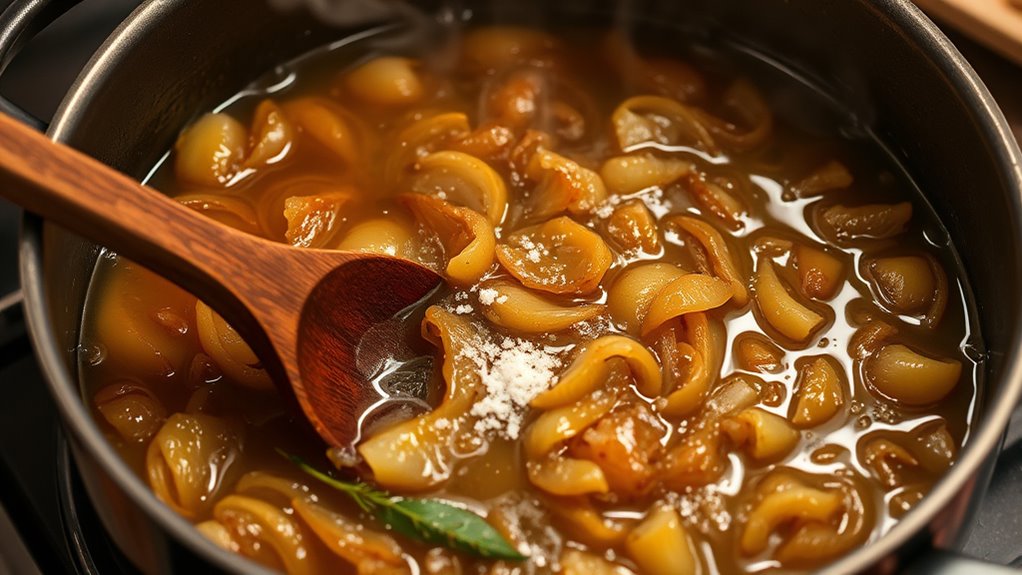
- Slice the onions.
- Warm a sturdy pot over medium heat.
- Melt a generous amount of butter or olive oil in the pot.
- Sauté the onions until they turn amber.
- Season lightly with salt.
- Stir consistently to prevent scorching, adjusting heat as needed to keep a steady simmer.
- Deglaze the pot with a small splash of water or wine to lift browned bits.
- Add kosher broth.
- Maintain gentle heat to coax depth without excessive browning.
- Use techniques that amplify sweetness: patience, even coverage, and gradual reduction.
- Consider adding a pinch of sugar, a bay leaf, and thyme for flavor enhancement.
- Simmer until the aroma is inviting but restrained.
- Taste and adjust seasoning as necessary.
- Serve at a quiet, confident temperature.
How to Serve

Serving Kosher French Onion Soup is about presentation and temperature as much as flavor. You plate with care, ensuring bowls are warm before serving and the broth sits at a steady, inviting simmer. For serving, portion with restraint, so the crouton tops remain crisp rather than soggy. Keep cheese a light, even layer that melts without pooling. If you ladle, do so slowly to preserve the onion sweetness and clear broth. Serving suggestions should emphasize balance: a modest cheese cap, a pale caramel color, and steam that invites tasting. Garnish ideas stay intentional—thin herb sprigs, a whisper of cracked black pepper, or a final drizzle of olive oil for sheen. Serve immediately, and enjoy the refined simplicity.
Tips
To make your Kosher French Onion Soup shine, start with the onions: slice thinly and cook slowly to deepen their sweetness without browning too aggressively. You’ll sharpen control by timing your reductions and tasting as you go.
To coax sweetness from onions, slice thin and simmer slowly, tasting as you go.
- Use low heat and steady movement to guide color, not speed.
- Deglaze with kosher-friendly broth, then scrape for richer depth.
- Season gradually, balancing salt, pepper, and a touch of umami for flavor enhancements.
- Finish with precise garnishes that respect the broth’s integrity and invite variation.
Tips stay focused on technique and restraint, inviting you to explore soup variations while preserving clarity and tradition. This approach keeps the finish clean, honest, and liberating in character.
Food Value and Benefit
The value of Kosher French Onion Soup lies in its balanced and comforting profile, offering a nourishing and health-conscious option for any meal. This soup combines wholesome ingredients that provide essential vitamins, minerals, and dietary fiber while maintaining a low-fat and low-sodium content.
Benefits of eating Kosher French Onion Soup include:
- Rich source of dietary fiber from onions, which supports digestive health.
- Contains vitamin C and B vitamins, contributing to immune function and energy metabolism.
- Provides essential minerals such as potassium and manganese, important for heart health and antioxidant protection.
- Low in sodium due to the use of low-sodium broth, promoting better blood pressure control.
- Caramelized onions add natural sweetness without added sugars or fats.
- Contains prebiotic compounds that encourage healthy gut microbiota.
- Uses herbs and lean toppings to enhance flavor while keeping calorie content moderate.
- Supports sustained energy release and satiety through balanced portion size and nutrient profile.
Frequently Asked Questions
Can I Substitute Kosher Onions With Another Variety?
Yes, you can substitute, but choose milder or sweeter varieties with similar sweetness; Substituting onions changes flavor. You’ll want balanced caramelization. Consider onion varieties like yellow or white, adjusting cooking time for comparable depth in your dish.
Is Wine Required for a Kosher-Certified Soup?
Yes, you can opt out of wine; kosher-certified soup can use stock or non-alcoholic alternatives. If you choose wine, use kosher wine, and adjust for flavor, noting cooking methods that preserve guidance and balance.
Are Gluten-Free Croutons Acceptable for This Recipe?
Can you use gluten-free croutons? Yes—you can. Gluten free alternatives exist, and their flavor matters less than proper crouton preparation. You’ll want crisp, dry, well-seasoned toppings that honor tradition while embracing freedom in design.
Can I Freeze the Soup After Cooking?
Yes, you can freeze it. For best results, use proper freezing techniques and follow storage guidelines. Cool thoroughly, portion, and seal well. Label with date, then thaw slowly, reheat gently, and avoid quality loss from freezer burn.
What Dairy Substitutions Work With This Soup?
You can substitute dairy with coconut cream or almond milk, choosing the option that fits your taste. Start with a small amount, adjust gradually, and guarantee you maintain creaminess without overpowering the onion flavor.
References
- https://www.chabad.org/recipes/recipe_cdo/aid/1357/jewish/Kosher-French-Onion-Soup.htm
- https://www.jewishfoodexperience.com/french-onion-soup/
- https://www.myjewishlearning.com/recipe/french-onion-soup/
- https://www.foodnetwork.com/recipes/articles/how-to-make-french-onion-soup
- https://www.nytimes.com/recipes/1019735/french-onion-soup
- https://www.seriouseats.com/classic-french-onion-soup-recipe
- https://www.thekitchn.com/how-to-make-french-onion-soup-139063
